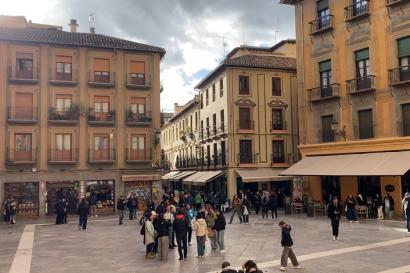“Excuse me, could you please tell me how to get to the Alhambra?”
I must get asked this at least five times a day.
Ok, maybe I’m exaggerating a little, but it happens all the time. When I’m walking to class, sitting alone at a cafe, or even jogging with my headphones in, people seem to go out of their way to ask me for directions (often instead of asking a Spaniard nearby).
It only takes a few seconds of talking with me for them to realize that I am 1) not Spanish 2) not the best at giving clear directions. (Except when it comes to getting to the Alhambra - just look up, you can’t miss it!) They either accept my vague directions graciously, or thank me politely while eyeing out another prospect.
But the frequency of these occurrences has me thinking, have I mastered the art of acting Spanish? My blond hair and blue eyes are not exactly indicators that I would be a reliable source of local information. So what is it that has both Spaniards and tourists confusing me with a granadina?
My theory is that I have adopted subtle differences in the way I dress, walk, and talk that allow me to blend in will the local crowd. Más o menos. So here is my guide, based entirely on non-scientific observations, on how to look and act Spanish.
Dress
Differences in fashion are some of the clearest distinguishers among cultures. Worldwide, Europeans have a reputation for dressing well. Spaniards are no exception. On the whole, they put great effort into looking nice whenever they leave the house.
Granted, among Spanish students, fashion trends are a bit edgier than American style (funkier colors, tighter and more revealing cuts, ripped and frayed jeans). This may give the impression that anything casual goes. However, your average Spanish student would never show up to class in something that could be confused for pajamas. There is always effort behind each ensemble.
Along those lines, it’s also hard to be overdressed in Spain. People love to dress up nicely to go out to nightclubs, or even just for drinks and tapas. Dark jeans, pantsuits, and high heels are popular choices among women (even on those treacherous, cobblestone streets). Men wear dress pants, button-ups, and nice loafers. Your average wedding in Spain also rivals in style any royal wedding I’ve seen. Women sport elegant dress suits or ball gowns with matching accessories, while men wear perfectly tailored tuxedos.
But if you’re not ready to make the change from American, casual wear to Spanish, formal attire quite yet, here are some things to avoid wearing so you don’t stand out.
Don’t wear shorts. I repeat. Do. Not. Wear. Shorts. It’s still winter here in Granada, but the intense Andalusian summer is on its way. That nice pair of denim cutoffs will start to look very tempting as temperatures rise. But despite the brutal heat, it is uncommon for men or women to wear shorts and it’s an easy marker of an American. So invest in some lightweight jeans and khakis and you’ll save yourself a lot of trouble.
T-shirts with logos of organizations or event names should also be avoided. And men, please don’t wear your fraternity t-shirt, and especially don’t wear a shirt that references your girlfriend’s sorority. Nothing screams American, male, college student like a shirt that reads, “Only True Gentleman Date Delta Gammas.”
And in general, avoid wearing sweats or workout clothes unless you are actually going to or coming from the gym. This is not to say that you won’t occasionally see a Spaniard picking up groceries in a sweatshirt or yoga pants, but it’s not very common, and there’s no reason to stand out if you don’t have to. So make an effort to look put-together in all contexts and it will go a long way.
Walk
At my home university, many students walk to class slouched over with their headphones in and avoid making conversation. My friend from New York confirmed that to her, being polite in public means occupying her own space and getting where she needs to go without any disrupting anyone.
Now Spaniards don't stop to make conversation with complete strangers, but they are a bit more open and aware of their surroundings in public. However, streets are narrow and windy, and collisions are inevitable. But while you as an American might bump into a Spaniard and immediately turn around to apologize, they are probably already halfway down the block. They either didn’t feel it, or more likely, they did and were not at all bothered or offended.
In Spain, you walk with purpose, but without rush. Carrying food or coffee on-the-go is also a giveaway for a foreigner. This goes back to the taboo of wearing sweats outside the context of working out. Here, coffee is to be consumed in a cafe. Workout clothes are to be worn at the gym. And the street is the realm where you walk with calm determination to each of these separate spaces.
Talk
So now that you look the part and can walk-the-walk, it’s time to talk-the-talk. First things first: get close. The concept of personal space here is very different from that in the states. Spaniards are an intimate bunch. No matter how long you’ve known someone, you’re obliged to kiss them on both cheeks when you meet up. It’s also common to maintain a hand on a friend’s arm or shoulder as you talk. Furthermore, bars in Granada are often tiny, crowded, and noisy, with standing room only. So if you’re not comfortable cozying up to your conversation partner, you may be in for a frustrating evening of leaning in to ask them, “What??”
And what does one talk about over tapas, you may ask? Pretty much anything is fair game, except for one of the most common conversation topics in the States: work. My friends and I at home bond over how miserable and swamped we are with schoolwork. And my parents’ friends often indulge in discussing their jobs with each other. My Spanish friends do talk about work from time to time, but it is never a topic to dwell on. And complaining about how stressed you are is also uncommon, and almost a bit rude. So stick to sports, culture, news, or your personal life, and leave the stress for your day job.
Another thing to accept is that while bars here can be overflowing with lively conversation, there is a difference between being loud as a Spaniard and being loud as a foreigner. There does exist the stereotype that American students in particular are obnoxious and disrespectful. I think this notion is unfair. Speaking English among a large group of friends simply makes you stand out among Spanish speakers. My friends and I always make an effort to speak to each other exclusively in Spanish in restaurants and in our residence hall, not just because it’s good practice, but because it’s a sign of respect. By making the effort to speak the local language, no matter your level, you break down at least one cultural barrier. And in my experience, Spaniards admire and reward any effort you make.
So what’s the takeaway from this cultural guide? First off, Spain is a large country with a variety of cultures, customs, and traditions. The cultural norms that I’ve chosen to highlight are drawn from my experiences in Granada and Sevilla. They do not reflect the cultural and individual variations found across Spain’s many regions.
Furthermore, while I may follow my own advice and occasionally be mistaken for a Spaniard, several of my American friends will never have this experience. The truth is we are all diverse and unique. We carry with us both our personal and cultural notions of style, politeness, and personal space. If your goal as a foreigner is to blend in, you will quickly become frustrated and lose much of what you have to offer as an ambassador of your own country. However, if you are aware and respectful of another culture’s norms, you put yourself in a position to promote positive, cultural exchange. Simply being aware of cultural differences can turn moments of negative culture shock into memorable conversations and lasting connections.
So take all the advice in this guide with a grain of salt (and a splash of olive oil as the Spaniards do!) And continue to make conscious decisions about what you can take from and offer to your host country.

Emily Churchill
Hola caracolas! My name is Emily and I'm studying abroad in Granada, Spain for the 2017-2018 academic year. I'm a Spanish and International Studies major who is always looking for new ways to connect with my beautiful host city. I love to sing, play guitar, act, and have embarked on the journey of writing a historical fiction novel about Granada! In my free time, I love to run and hike in the Sierra Nevada mountains, get lost in the Albaicin, and explore new cafes and tapas bars with my friends. This semester I hope to try my hand at Flamenco guitar, take more siestas, and make even deeper connections with the city and its people.









